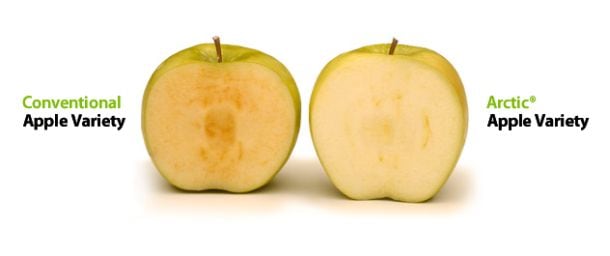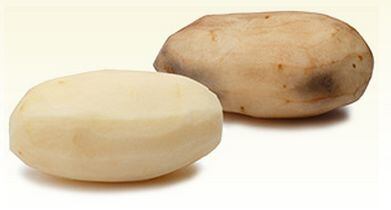Granny Smith and Golden Delicious ‘Arctic Apples’ have been genetically engineered to limit production of the enzyme polyphenol oxidase, which causes browning, meaning foodservice operators will no longer need to spray or dip sliced apples with ascorbic acid, citric acid and calcium salts to delay browning.
Similarly, superficial damage caused during handling such as minor finger bruising, won’t show, reducing food waste, says Okanagan Specialty Fruit.
Meanwhile, six varieties of potatoes from Simplot (brand name ‘Innate’) have been genetically engineered to have lower levels of reducing sugars and of asparagine, an amino acid found naturally in potatoes and cereals that reacts with these sugars via the Maillard reaction when products are fried, baked or roasted to produce acrylamide, a suspected carcinogen.
By lowering the levels of certain enzyme, they also reduce black spots from bruising, and stay whiter longer when cut or peeled, resulting in less potato waste, says Simplot.
FDA: Foods derived from genetically engineered plants must meet the same standards as foods derived from traditional plant breeding methods
In a statement issued Friday, the FDA said: “Foods derived from genetically engineered plants must meet the same legal standards, including safety standards, as foods derived from traditional plant breeding methods. As part of its consultation process, Okanagan and Simplot submitted to the FDA a summary of their safety and nutritional assessments.
“The consultation process includes a review of information provided by a company about the nature of the molecular changes and the nutritional composition of the food compared to traditionally bred varieties,” added Dennis Keefe, Ph.D., director of the FDA’s Office of Food Additive Safety.
“This case-by-case safety evaluation ensures that food safety issues are resolved prior to commercial distribution."

CSPI: These crops are safe, but mandatory pre-approval process is badly needed to reassure the public
Gregory Jaffe, biotechnology director at the Center for Science in the Public Interest (CSPI) welcomed the news, noting that there is "no reason" why these products would pose any food safety or environmental risk:
"Both products were made by manipulating DNA from within their species to have useful properties; the apple resists browning and the potato resists bruising and results in less formation of the carcinogen acrylamide when cooked at high temperature.”

That said, the voluntary nature of the regulatory process for assessing them is “badly flawed”, he argued: "No regulatory process should have to rely on the voluntary acquiescence by the regulated party.Congress should pass legislation that requires new biotech crops to undergo a rigorous and mandatory approval process before foods made from those crops reach the marketplace.”
FoE: Farmers don’t want to grow it, food companies don’t want to sell it and consumers don’t want to eat it
Anti-GMO activists at Just Label It, Food & Water Watch, the Environmental Working Group, the Consumers Union, the Center for Food Safety, and Friends of the Earth have also raised concerns about the regulatory process for such crops.
Unlike the CSPI, they also argue that the technology underpinning Innate potatoes and Arctic apples is "dangerously imprecise" with potentially unforeseen consequences, a claim that Simplot and Okanagan Specialty Fruit strongly refute.
(Click HERE for a response from Arctic Apples creator Neal Carter to this allegation, and click HERE to see the response from David S. Douches, Ph.D. at the Department of Crop and Soil Sciences at Michigan State University, who has implemented field trials of Simplot's Innate varieties.)
However, the biggest concern raised by the groups above relates to transparency. While the brand names ‘Arctic apples’ and 'Innate potatoes' will be familiar to some consumers who are engaged in the 'GMO debate', not spelling out at the point of sale or via product labels that these foods have been genetically engineered is deceptive, they argue.
FoE Food and Technology program director Lisa Archer said of the Arctic Apple: “Farmers don’t want to grow it, food companies don’t want to sell it and consumers don’t want to eat it.”
